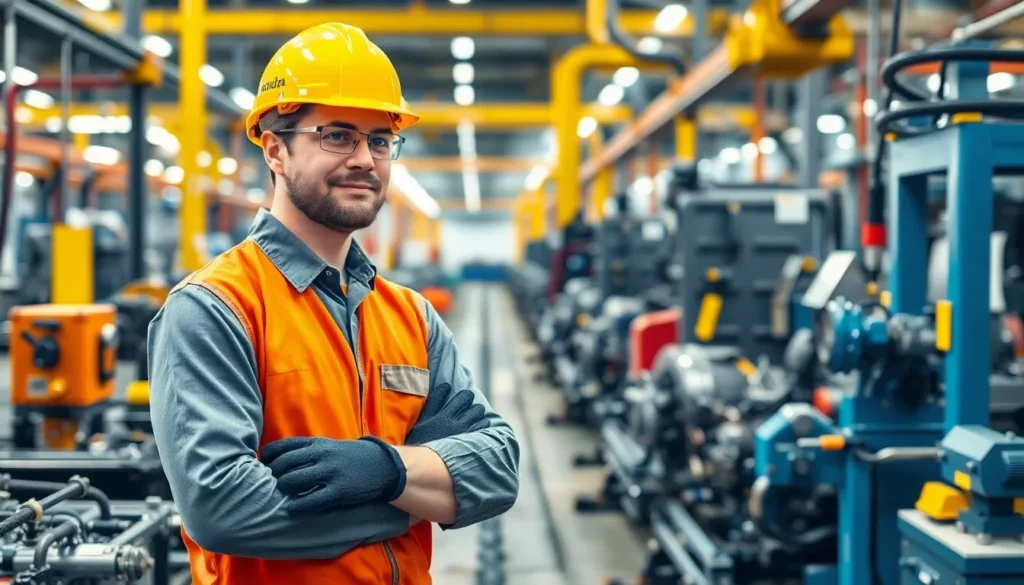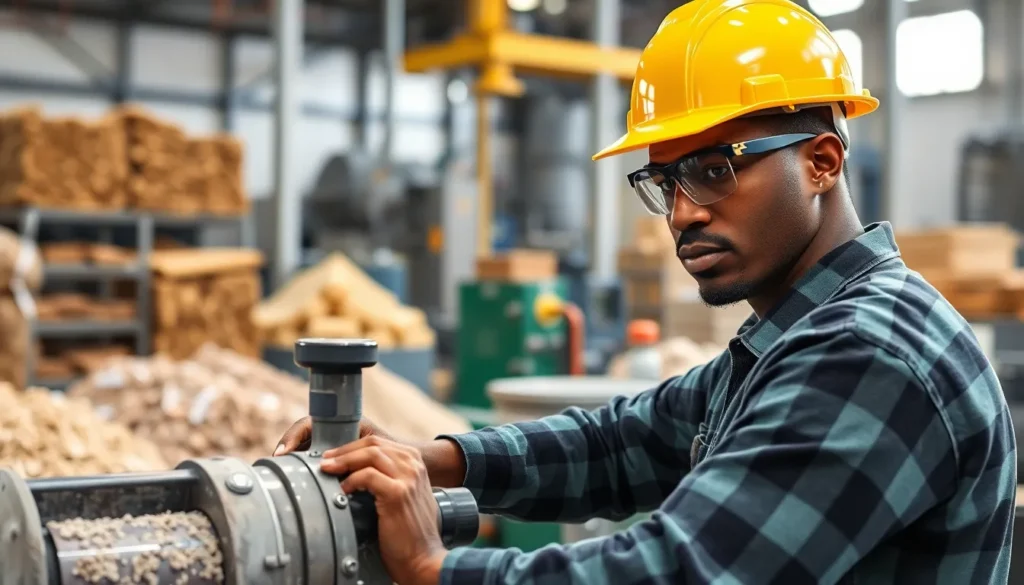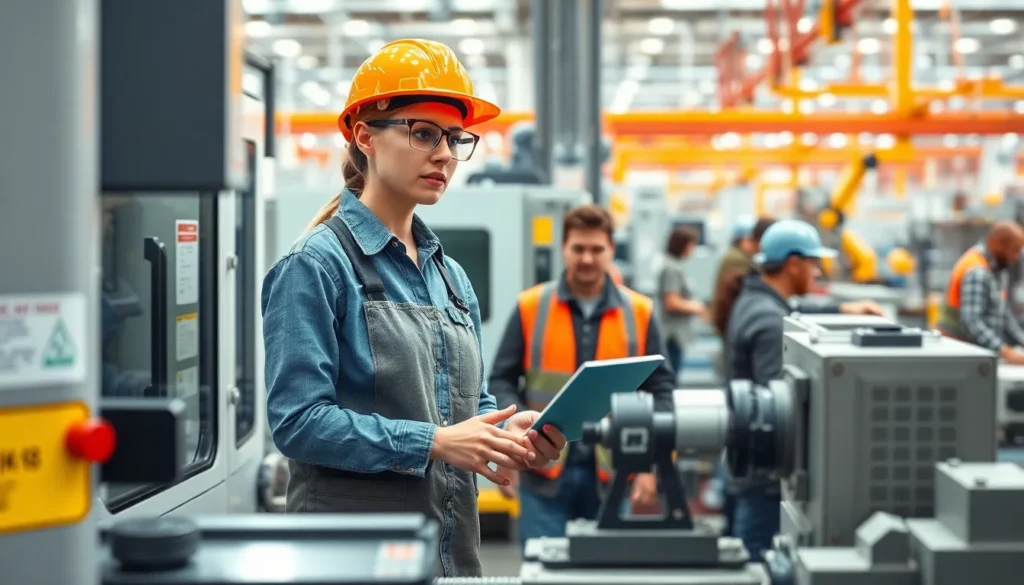In a world driven by efficiency and innovation, industrial processes are the unsung heroes of production. They transform raw materials into the products that fuel our daily lives, from the coffee that kickstarts the morning to the gadgets that keep us connected. But what exactly are these processes? Think of them as the intricate dance of machinery, technology, and human ingenuity working together to create everything we depend on.
What Are Industrial Processes
Industrial processes are vital for transforming raw materials into finished products. These processes encompass various techniques, including manufacturing, processing, and assembly. They synthesize materials in large volumes, providing essential goods for industries.
Categories of industrial processes include batch processing, continuous processing, and discrete manufacturing. Batch processing involves producing a set amount of product before stopping, suitable for food and chemical industries. Continuous processing, on the other hand, operates without interruption, ideal for oil refining and power generation. Discrete manufacturing focuses on individual units or products, prevalent in automotive and electronics sectors.
Equipment and technology play crucial roles in industrial processes. Machinery ensures efficiency, accuracy, and consistency. Automation often enhances productivity by reducing labor costs and minimizing human error. These advancements enable companies to produce high-quality products while maintaining competitive pricing.
Human expertise cannot be overlooked. Skilled workers design, operate, and maintain equipment, ensuring smooth operations. Their knowledge of industrial processes contributes significantly to innovation and process improvement. A collaborative environment between technology and human skills drives progress in various industries.
Optimization of industrial processes often leads to increased sustainability. Manufacturers adopt eco-friendly practices, reducing waste and energy consumption. Sustainable processes support compliance with regulations and enhance brand reputation. By prioritizing sustainability, companies create value for shareholders and contribute positively to the environment.
Industrial processes form the backbone of modern production. Their complexity and efficiency reflect the careful blend of technology and human skills, responding effectively to the demands of society.
Types of Industrial Processes

Industrial processes can be categorized into three primary types: continuous processes, batch processes, and discrete processes. Each type serves distinct functions within various industries.
Continuous Processes
Continuous processes operate seamlessly without interruption. Industries such as petroleum and chemicals utilize these processes to ensure constant output. Efficiency defines continuous processes, as they maximize production and minimize downtime. Technology often automates these systems, which enhances precision and lowers operational costs. Products flow through the system in a steady stream, allowing for large-scale production. This method supports high-volume demand and achieves consistent quality across units.
Batch Processes
Batch processes involve producing goods in specific quantities. This method allows for variations in product types or formulations between batches. Industries like food and pharmaceuticals frequently employ batch processes to ensure flexibility. Each batch produces a defined amount of product before a new process begins. Operators can adjust parameters for each cycle, which aids in quality control. This technique supports efficient use of resources while accommodating changing market demands.
Discrete Processes
Discrete processes focus on manufacturing individual items or distinct units. Producers in sectors such as automotive and electronics heavily rely on this method. Parts are assembled, tested, and packaged separately. Each unit goes through defined stages of production, ensuring high customization. Monitoring occurs at multiple steps to guarantee quality standards are met. This process type allows for adaptable production lines that can be reconfigured for different products as needed.
Components of Industrial Processes
Industrial processes consist of several key components that work together to produce goods efficiently. Understanding each component is essential for optimizing production methods.
Raw Materials
Raw materials serve as the starting point for industrial processes. Sourcing high-quality materials ensures that finished products meet consumer standards. Various industries utilize different materials, such as metals, plastics, and agricultural products. Selection directly impacts production costs and product quality. For instance, the automotive industry relies on steel and aluminum for durability, while the food industry uses fresh ingredients to produce quality goods. Efficient inventory management of raw materials influences overall productivity.
Equipment and Technology
Equipment and technology play a critical role in industrial processes. Advanced machinery enhances production efficiency through automation and precision. Various types of machinery include conveyors, mixing units, and CNC machines. Integration of data analytics and Internet of Things (IoT) technology enables real-time monitoring of production metrics. This connectivity improves decision-making and responsiveness in operations. Regular maintenance of equipment minimizes downtime and prolongs the lifecycle of machines. Implementing innovative technologies fosters continuous improvement in process performance.
Human Factors
Human factors significantly influence industrial processes. Skilled workers drive innovation and maintain operational efficiency. Training programs equip employees with the necessary skills to operate complex machinery and solve production problems effectively. Collaboration among teams enhances creativity and improves problem-solving capabilities in the workplace. Effective communication pathways facilitate smoother workflows and reduce errors. Worker safety remains a top priority, ensuring a secure environment while maximizing productivity. A strong focus on human factors contributes to overall process success.
Importance of Industrial Processes
Industrial processes play a crucial role in shaping the economy and the environment. Their efficiency directly influences productivity and sustainability.
Economic Impact
Industries significantly contribute to economic growth. They generate jobs, fueling local economies with stable employment opportunities. Manufacturing accounts for about 8.5% of the U.S. GDP, showcasing its importance. Increased production leads to higher output and sales, ultimately benefiting the entire supply chain. Revenues from industrial processes support communities, funding infrastructure and services. Global trade expands with advancements in technology, driving competition and innovation. Countries investing in these processes often see enhanced competitiveness on the world stage.
Environmental Considerations
Sustainable industrial processes are essential for environmental health. Many manufacturers now prioritize eco-friendly practices to minimize waste and conserve resources. Energy-efficient technologies significantly reduce carbon footprints, supporting global climate goals. Compliance with regulations is crucial as businesses aim to meet increasingly strict standards. Implementing circular economy principles helps industries recycle waste and promote sustainable resource use. Through these practices, companies not only enhance their brand image but also contribute to long-term ecological wellbeing.
Challenges in Industrial Processes
Industrial processes face several challenges that impact efficiency, safety, and regulatory compliance. These challenges require attention and strategic solutions to maintain production standards.
Efficiency and Optimization
Achieving efficiency in industrial processes involves constant monitoring and adjusting of operations. Continuous improvement methods, such as Lean and Six Sigma, help identify waste and streamline operations. Automation technology enhances productivity, reducing human error and accelerating production rates. Manufacturers must analyze data for process optimization, utilizing advanced analytics and machine learning for better decision-making. Maintaining equipment also plays a vital role in reducing downtime, ensuring consistent productivity levels. Adopting sustainable practices benefits both efficiency and the environment, creating a competitive advantage in the market.
Safety and Regulation
Safety remains a top priority in industrial processes, with regulations set to protect workers and the environment. Compliance with Occupational Safety and Health Administration (OSHA) standards ensures a safer workplace. Effective training programs equip workers with the necessary skills to handle equipment correctly and respond to emergencies. Regular safety audits help identify potential hazards, fostering a proactive approach to risk management. Additionally, staying informed on environmental regulations aids manufacturers in minimizing their ecological footprint. By implementing safety protocols and engaging in continuous training, companies can maintain a safe environment while meeting compliance demands.
Conclusion
Industrial processes are vital to the fabric of modern society. They not only transform raw materials into essential products but also drive innovation and sustainability. By integrating advanced technology with skilled labor, these processes ensure efficiency and quality across various sectors.
The emphasis on eco-friendly practices highlights a growing awareness of environmental responsibility. As industries continue to evolve, the focus on optimizing operations while adhering to safety and regulatory standards remains paramount. This ongoing commitment to improvement ensures that industrial processes will continue to meet the demands of consumers and contribute positively to the economy and the environment.



